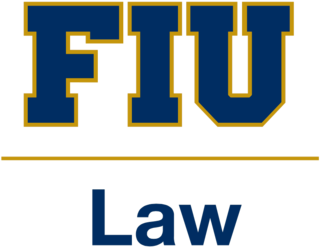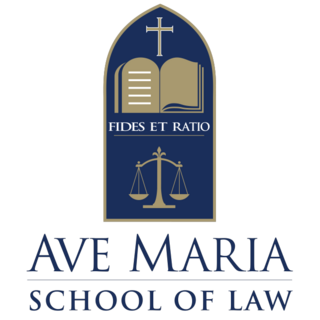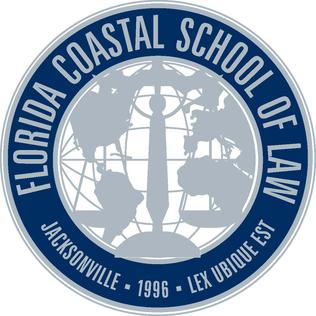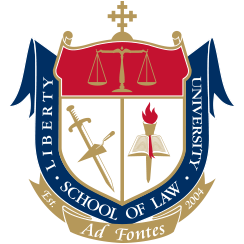Related Research Articles

A law school in the United States is an educational institution where students obtain a professional education in law after first obtaining an undergraduate degree.

Brooklyn Law School (BLS) is a private law school in New York City. Founded in 1901, it has approximately 1,100 students. Brooklyn Law School's faculty includes 60 full-time faculty, 15 emeriti faculty, and adjunct faculty.

The Florida International University College of Law is the law school of Florida International University, located in Miami, Florida in the United States. The law school is accredited by the American Bar Association, and is the only public law school in South Florida. FIU College of Law is the third highest ranked law school in the state of Florida and is ranked in the top 60 in the nation. The College of Law has also achieved the highest July bar exam passage in the state of Florida consecutively for the last seven years (2015–2022).

Quinnipiac University School of Law is the law school of Quinnipiac University located in North Haven, Connecticut. Quinnipiac Law is the newest law school in Connecticut, having received full accreditation from the American Bar Association (ABA) in 1992. It is a member of the Association of American Law Schools, and is currently ranked tied at 143rd by U.S. News & World Report.

Whittier Law School was a law school in Costa Mesa, California founded in 1966. The law school was part of Whittier College, a private institution. After several years being ranked among the poorest-performing law schools in the United States based on bar passage rate and job placement, Whittier Law School announced in April 2017 that it would no longer be admitting students and would discontinue its legal program, becoming the first law school with full accreditation by the American Bar Association (ABA) to shut down in at least 30 years. Since the school's closure, transcript requests are now handled by Whittier College.

Ave Maria School of Law is a private Roman Catholic law school in Naples, Florida. It was founded in 1999 and is accredited by the American Bar Association.
Mississippi College School of Law is an American Bar Association accredited law school. MC Law is one of two law schools in the state of Mississippi, and is the only law school in the capital city of Jackson, Mississippi. The school is a professional school of Mississippi College, founded in 1826.

The Michael E. Moritz College of Law is the law school of Ohio State University, a public land-grant research university in Columbus, Ohio. Founded in 1891, the school is located in Drinko Hall on the main campus of the Ohio State University in Columbus. The school is accredited by the American Bar Association (ABA) and is a charter member of the Association of American Law Schools.

Florida Coastal School of Law was a private for-profit law school in Jacksonville, Florida. It was established in 1996 and was the last operating of three for-profit law schools of the InfiLaw System owned by Sterling Partners. Because of funding and accreditation issues, the school closed its doors in 2021. U.S. News & World Report ranks Coastal Law 147-193, its lowest law school ranking. In July 2022, the school had the lowest Florida bar passage rate of all Florida law schools, at 31%.
Elon University School of Law is an American law school located in Greensboro, North Carolina, occupying the former downtown public library building. Established in 2006, Elon Law is one of nine graduate programs offered by Elon University. It earned full accreditation from the American Bar Association in 2011 and has announced plans to introduce a part-time program for working professionals in Charlotte, North Carolina, beginning in Fall 2024.
The Charleston School of Law is a private for-profit law school in Charleston, South Carolina. It was established in 2003 and accredited by the American Bar Association (ABA) in August 2011. The school was founded upon a principle of promoting public service by its students and graduates; each student must perform at least 50 hours of public service before graduation. According to the school's 2021 ABA-required disclosures, 85% of the Class of 2017 obtained full-time, long-term, JD-required employment nine months after graduation.
Chapman University's Dale E. Fowler School of Law, commonly referred to as Chapman University School of Law or Fowler School of Law, is a private, non-profit law school located in Orange, California. The school offers the Juris Doctor degree (JD) and combined degree programs including a JD/MBA, and a JD/MFA in Film & Television Producing. The school also offers emphasis options in Business Law, Criminal Law, Entertainment Law, Environmental Law, Entrepreneurial Law, International Law, Trial Advocacy, and Taxation. Currently, the school has 41 full-time and 58 part-time faculty and a law library with holdings in excess of 290,000 volumes and volume equivalents.

The Thomas Goode Jones School of Law is the law school of Faulkner University, located in Montgomery, Alabama.
The Valparaiso University Law School was the law school of Valparaiso University, a private university in Valparaiso, Indiana. Founded in 1879, the school was accredited by the American Bar Association in 1929 and admitted to the Association of American Law Schools in 1930. In October 2016, the ABA censured the school for admitting applicants who did not appear capable of satisfactorily completing the school's program of legal education and being admitted to the bar. One year later, the school suspended admissions and shut down after the last class graduated in 2020.

The Arizona Summit Law School was a for-profit law school in Phoenix, Arizona, that operated from 2005 to 2018. The law school was known until 2013 as the Phoenix School of Law, and was a part of the InfiLaw System of independent, for-profit law schools, which includes Florida Coastal School of Law and Charlotte School of Law, owned by Sterling Partners.

The Norman Adrian Wiggins School of Law is a private law school in Raleigh, North Carolina, United States. Founded in 1976, the law school is one of six graduate programs offered by Campbell University. The school is named after its founder, Norman Adrian Wiggins, former President and Chancellor of Campbell University, and creator of the institution's law division. Originally housed on the main campus of Campbell University in Buies Creek, the school moved to a newly constructed facility in downtown Raleigh in September, 2009.

The Liberty University School of Law is the law school of Liberty University, a private evangelical Christian university in Lynchburg, Virginia. The school offers the J.D., L.L.M., and J.M. degrees.
Regent University School of Law is the law school of Regent University, a private Christian university in Virginia Beach, Virginia. It was founded in 1986 and accredited by the American Bar Association in 1996.

Wake Forest University School of Law is the law school of Wake Forest University, a private research university in Winston-Salem, North Carolina. Established in 1894, Wake Forest University School of Law is an American Bar Association (ABA) accredited law school and is a member of the Association of American Law Schools (AALS). The current dean is Andrew R. Klein.
The InfiLaw System was a for-profit consortium of three independent law schools in the United States. It was owned by Sterling Partners, a Chicago-based private equity firm, and was headquartered in Naples, Florida. Charlotte School of Law in Charlotte, North Carolina and Arizona Summit Law School in Phoenix closed, the latter after losing ABA accreditation. InfiLaw relinquished its ownership of Florida Coastal School of Law in Jacksonville, Florida in April 2021, with that entity closing its doors after its Summer, 2021 term.
References
- ↑ Thomas, Jennifer (November 17, 2016). "Charlotte School of Law placed on probation by bar association". Charlotte Business Journal. American City Business Journals. Retrieved September 27, 2017.
- ↑ "Charlotte School of Law loses federal student aid over 'dishonest' practices".
- 1 2 "Charlotte Alumni".
- 1 2 "Charlotte lawsuits".
- 1 2 3 Olson, Elizabeth (15 August 2017). "For-Profit Charlotte School of Law Closes". New York Times. New York Times. Retrieved 16 August 2017.
- 1 2 Sloan, Karen (January 17, 2019). "Ex-Charlotte Law Students Get $2.7 Million Settlement, Despite Objectors". Law.com. Retrieved April 15, 2019.
- ↑ "Judge approves settlement between students, Charlotte School of Law". Channel 9 WSOC-TV. 11 January 2019. Retrieved 15 April 2019.
- ↑ gordon, Michael; Albrough, Maria (May 21, 2018). "Charlotte School of Law turns to one of America's top lawyers to fight back in lawsuit". The Charlotte Observer. Retrieved April 15, 2019.
- 1 2 3 4 "ABA Required Disclosures". Charlotte Law School. Archived from the original on 2017-06-06.
- ↑ "Grading System".
- ↑ Patrice, Joe (January 19, 2017). "Charlotte Fires Dozens Of Faculty, Which Surprises No One". Above the Law. Retrieved September 27, 2017.
- ↑ "Charlotte School of Law Paid Students".
- ↑ "Charlotte School of Law Paid Students to Delay Taking the Bar".
- ↑ "Charlotte paying students not to take exam".
- ↑ "Charlotte School of Law Paid Students to Delay Taking the Bar".
- ↑ "Employment Statistics". Archived from the original on 2017-06-06.
- ↑ "Charlotte School of Law Profile". Archived from the original on 2014-07-14. Retrieved 2014-07-10.
- ↑ "Employment Summary for 2015 Graduates".
- ↑ "Tuition and Expenses". Archived from the original on 2014-08-09. Retrieved 2014-07-10.